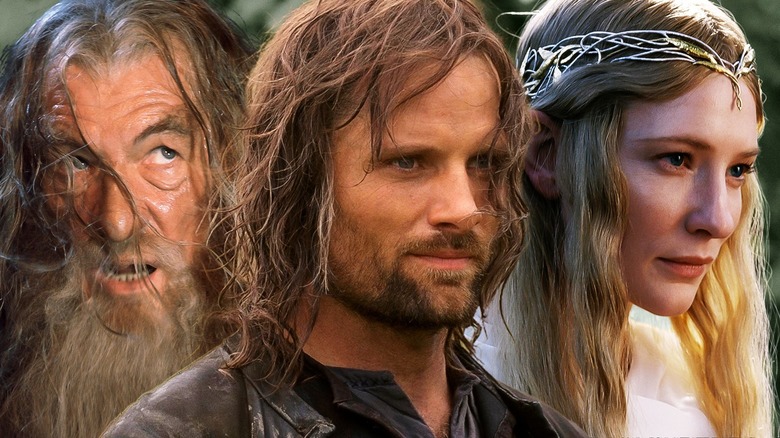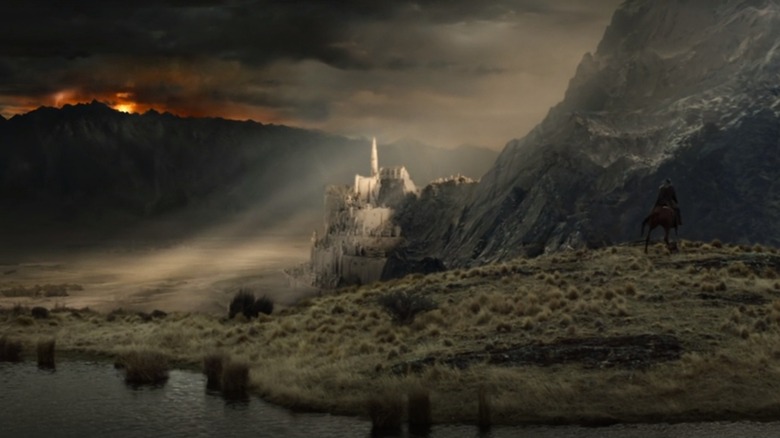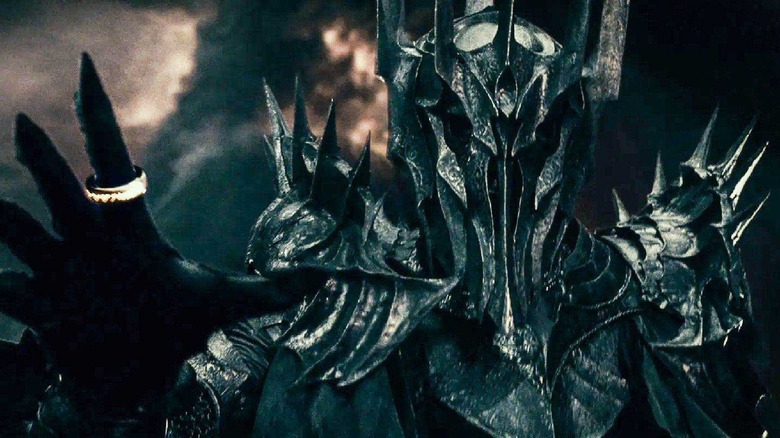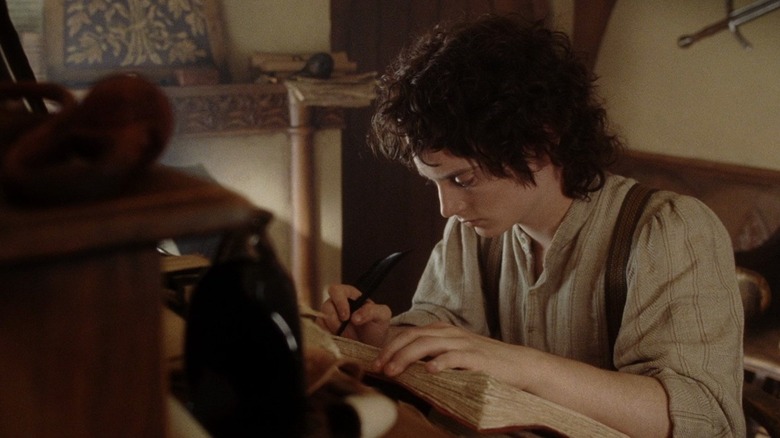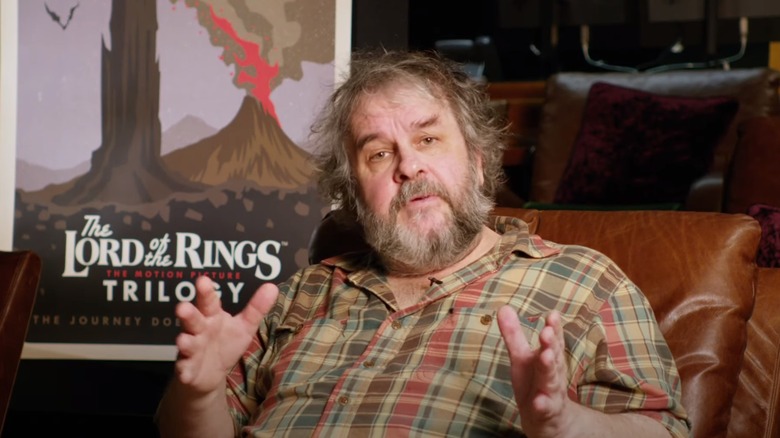The New Lord Of The Rings Movies Should Take A Cue From JRR Tolkien's Abandoned Sequel
How do you follow up the most quintessential epic in all of fantasy? That's the multimillion dollar question that the new "The Lord of the Rings" movies under Warner Bros. Discover and Embracer Group now have to figure out, but they're far from the first to seek a magical solution to this riddle in the dark. Ever since director Peter Jackson's definitive trilogy proved that audiences would respond to an adaptation of some of the densest and nerd-friendly material in fiction writing, it's always been a matter of time before someone else came along and figured out a way to squeeze some more juice out of this cash cow.
Clearly, creative approaches to this conundrum widely differ. Upon acquiring the television rights to Tolkien's writings, Prime Video moved forward by looking to the past — the very distant past, in fact, setting their prequel story thousands of years before the events of "The Lord of the Rings" during the Second Age of Middle-earth. In our own extensive breakdown speculating what ground these new movies could potentially cover, we discussed the likelihood that new stories could be told concurrently with the events of either "The Hobbit" or "The Lord of the Rings." But as it turns out, there's another tantalizing pathway that could very well deliver something new and original, with one added bonus: It comes straight from author J.R.R. Tolkien himself.
Ever wonder what happens in Middle-earth after the One Ring was destroyed, the Dark Lord Sauron was defeated (once more, admittedly, but with feeling this time), and Frodo and Gandalf sailed away into the sunset? Well, that's exactly the sequel story that Tolkien set out to write ... before scrapping it entirely.
The abandoned story was called "The New Shadow," and here's what it would've been about.
Evil returns
The basic premise of "The New Shadow" goes like this. Roughly 100-200 years after Sauron's defeat and Aragorn's coronation as King of Gondor, Aragorn's son Eldarion (whom viewers glimpsed in Arwen's vision/premonition from Jackson's "The Return of the King") reigns during the period of peace known as the Fourth Age of Middle-earth. But this prosperous moment in history is starting to reveal cracks hidden just beneath the surface, noticeable only to a select few.
As collected, edited, and annotated by Tolkien's son Christopher in the book "The Peoples of Middle-earth," the one and only chapter of "The New Shadow" that Tolkien ever wrote follows a deeply philosophical discussion (what else!) between two Gondorians living in the countryside nearby the capital city. One is the aged Borlas (the son of a soldier named Beregond who, in Tolkien's "The Return of the King," befriended the lonely Hobbit Pippin in Minas Tirith while Gandalf was busy with war preparations) and the other is a young man named Saelon. Despite the seemingly decisive triumph of good over evil during the now-distant War of the Ring, Borlas is troubled by moody thoughts of encroaching darkness (referred to as a "dark tree") stirring in the hearts of men.
In response, the mischievous Saelon reveals his generation's increasingly disaffected nature and subsequently confirms Borlas' suspicions. Evils that were once taboo no longer hold much power anymore. Saelon recalls how he and his friends would pretend to play as sinister Orcs in childhood, almost spitefully inspired by a stern Borlas once catching him stealing fruit from his orchard and hyperbolically (to Saelon, at least) referring to such behavior as "Orcs' work." Having held this grudge for years, Saelon then gleefully admits his knowledge of a mysterious shadowy figure — one whose name alone terrifies Borlas.
Meet the new shadow, same as the old shadow?
The subtle but undeniable rising tension in the conversation between Borlas and Saelon builds to a breaking point. Having spoken mostly in metaphors and hypotheticals to this point, Saelon takes the first step towards something frighteningly concrete when he evokes a dark name that casts a pall over the entire chapter: Herumor. Tellingly, Tolkien doesn't shed any further insights on this mysterious character, but allows Borlas' reaction — or lack of one — to say it all, as he can only stare open-mouthed at this young man he once thought he knew so well, "with amazement and fear." Borlas' inner monologue hints that he's previously heard rumor of this secret enemy, but never could've imagined that someone hearing it from someone so close to home.
Their once-lively discussion becomes a cat-and-mouse game, and one can practically sense Tolkien relishing in the wordplay. Borlas attempts to stop beating around the bush and find out how much Saelon knows, but the latter plays coy and merely answers his questions with more questions. This proves to be a calculated tactic, stemming from mutual mistrust and the heavily implied danger involved in both characters speaking too freely about what they know. But while neither chooses to openly answer how they know of Herumor, Saelon finally acquiesces and invites Borlas to join him in the dead of night, dressed entirely in black, to some sort of secret meeting that he promises will "...perhaps make the whispers clearer to you."
The chapter ends on a quietly disturbing note, with Saelon leaving and Borlas thinking over their words. He finally decides to accompany Saelon and have his questions answered, but can't escape the feeling that he sensed "...the old Evil and knew it for what it was."
On second thought...
If this brief snippet of "The New Shadow" seems completely different in tone and style from "The Lord of the Rings," you're not alone. As it turns out, that's one of the biggest reasons why Tolkien himself ultimately shelved this entire project — though, according to Christopher Tolkien's annotations, his father kept revising this chapter until as late as 1968 (over 10 years after the publication of "The Lord of the Rings"). In a letter to an associate, Tolkien laid out exactly why he finally put away his typewriter and left well enough alone:
"I did begin a story placed about 100 years after [Sauron's] Downfall, but it proved both sinister and depressing. Since we are dealing with Men it is inevitable that we should be concerned with the most regrettable feature of their nature: their quick satiety with good. So that the people of Gondor in times of peace, justice and prosperity, would become discontented and restless — while the dynasts descended from Aragorn would become just kings and governors — like Denethor or worse. I found that even so early there was an outcrop of revolutionary plots, about a centre of secret Satanistic religion; while Gondorian boys were playing at being Orcs and going around doing damage. I could have written a 'thriller' about the plot and its discovery and overthrow — but it would have been just that. Not worth doing."
In addition to revealing his preference against turning "The Lord of the Rings" into a conventional thriller, Tolkien also hints that the mysterious Herumor may have been a cult leader, coming to power as a result of the inherent weakness in the race of men who (essentially) don't know what to do with themselves in the absence of conflict. Unfortunately, it wasn't meant to be.
Take notes, Warner Bros.!
Ultimately, it's easy to see why Tolkien eventually thought better of diluting the magic of "The Lord of the Rings" with a tale that he himself called "both sinister and depressing." A thriller centered on uncovering a "Satanistic" cult would've definitely come across as a new and fresh addition to the lore, wholly original from any of the more mythical stakes depicted in the main trilogy of novels. But, ultimately, the idea of evil persisting in the hearts and minds of people brought up in peacetime definitely feels like retreading the same ground that Tolkien did in "The Return of the King" — specifically, in the chapter entitled "The Scouring of the Shire" where our heroic group of Hobbits come home to find their home country ravaged by a far more relatable form of evil than Sauron ever boasted.
But here's the difference when it comes to whatever new movies that Warner Bros. has in mind. Since Peter Jackson opted to leave out that entire epilogue from his trilogy-capping movie, loosely adapting this premise for a new movie would feel completely unique and original.
The pesky rights situation hanging over all these proceedings can't be ignored, as it's possible (if not likely) that an excerpt from an unfinished Tolkien novel would remain well outside the purview of Warner Bros. Discovery and Embracer. But in terms of storytelling approach, you tell me what sounds more intriguing. Would you rather a movie loosely inspired by "The New Shadow" that tells a new story in an as-of-yet unseen period in Middle-earth history that moves the story forward, or "The Lord of the Rings Origins: Aragorn" retreading all the same ground we've seen before?
Take notes, Warner Bros. With "The New Shadow," Tolkien might've pointed the way forward yet again.
